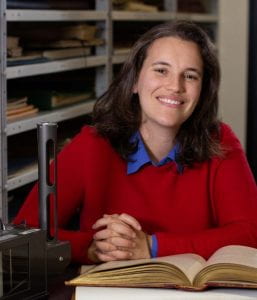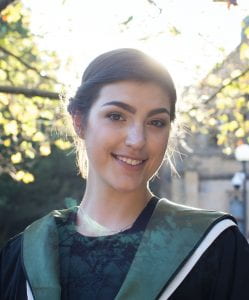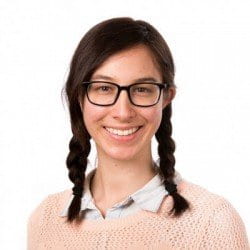About Us
Dr Jen Martin
 Dr Jen Martin spent many years working as a field ecologist until she decided the most useful thing she could contribute as a scientist was to teach other scientists how to be effective and engaging communicators. Jen founded, leads and teaches the University of Melbourne’s acclaimed Science Communication Teaching Program. She is deeply committed to helping scientists develop the skills they need to be visible, make connections and have impact. In 2019, she was invited to join the Visibility Team within the Homeward Bound teaching Faculty.
Dr Jen Martin spent many years working as a field ecologist until she decided the most useful thing she could contribute as a scientist was to teach other scientists how to be effective and engaging communicators. Jen founded, leads and teaches the University of Melbourne’s acclaimed Science Communication Teaching Program. She is deeply committed to helping scientists develop the skills they need to be visible, make connections and have impact. In 2019, she was invited to join the Visibility Team within the Homeward Bound teaching Faculty.
Jen also practices what she preaches: for nearly 15 years she’s been talking about science each week on 3RRR, Australia’s largest community radio station, she writes a popular science blog Espresso Science, is a member of the Science Gallery Melbourne Leonardos and writes for CSIRO’s Double Helix Magazine. Jen was named the Unsung Hero of Australian Science Communication for 2019 by the Australian Science Communicators.
In order to face the imposter syndrome head-on, Jen is currently embracing a variety of new challenges. These include hosting medical podcasts, MCing events, writing a science communication textbook and running marathons.
Dr Linden Ashcroft
 Linden Ashcroft grew up in country Victoria on the lands of the Yorta Yorta people, and teaches weather and climate science as well as science communication. When she’s not teaching students how to share their science with the world, Linden researches the past to help us prepare for the future. By exploring the climate of Australia using historical documents and weather observations, she combines her love of science and stories!
Linden Ashcroft grew up in country Victoria on the lands of the Yorta Yorta people, and teaches weather and climate science as well as science communication. When she’s not teaching students how to share their science with the world, Linden researches the past to help us prepare for the future. By exploring the climate of Australia using historical documents and weather observations, she combines her love of science and stories!
She is a current Science and Technology Australia Superstar of STEM, a program that aims to smash society’s gender assumptions about scientists. Linden communicates science regularly on community radio, edits a peer-reviewed journal on scientific data, and her writing was selected for the 2019 Best Australian Science Writing Anthology. You can learn more about her work and outreach at lindenashcroft.com.
Dr Graham Phillips
 Graham’s been a scientist, journalist and science communicator. After completing a PhD in astrophysics and holding a few postdoctoral positions, he realised his true passion and moved into science journalism and communication. He’s written for almost every newspaper in Australia and had regular science columns in a number of them. He’s had regular television science spots on Channels Nine, Ten and Seven, and has spent many years with the ABC. He was the host and a producer-reporter on ABC TV’s Catalyst for a long time, and was also a presenter on Channel Seven’s Beyond Tomorrow. He has contributed many, many hours of science radio, and has had four popular science books published. He has also set up and taught in university journalism and science communication courses.
Graham’s been a scientist, journalist and science communicator. After completing a PhD in astrophysics and holding a few postdoctoral positions, he realised his true passion and moved into science journalism and communication. He’s written for almost every newspaper in Australia and had regular science columns in a number of them. He’s had regular television science spots on Channels Nine, Ten and Seven, and has spent many years with the ABC. He was the host and a producer-reporter on ABC TV’s Catalyst for a long time, and was also a presenter on Channel Seven’s Beyond Tomorrow. He has contributed many, many hours of science radio, and has had four popular science books published. He has also set up and taught in university journalism and science communication courses.
Dr Michael Wheeler
 Michael studied undergraduate exercise science at Dublin City University, Ireland. He moved to Australia to undertake a PhD jointly at The Baker Institute in Melbourne and the University of Western Australia (UWA) investigating the combined effects of exercise and sedentary behaviour on cardiovascular and cognitive function in older adults. He was awarded his PhD in 2019 along with The Paul Korner Medal from The Baker Institute and The Robert Street Prize from UWA for outstanding achievement. He is currently an active researcher investigating the effects of diet and exercise on human health.
Michael studied undergraduate exercise science at Dublin City University, Ireland. He moved to Australia to undertake a PhD jointly at The Baker Institute in Melbourne and the University of Western Australia (UWA) investigating the combined effects of exercise and sedentary behaviour on cardiovascular and cognitive function in older adults. He was awarded his PhD in 2019 along with The Paul Korner Medal from The Baker Institute and The Robert Street Prize from UWA for outstanding achievement. He is currently an active researcher investigating the effects of diet and exercise on human health.
Michael has developed a passion for all aspects of science communication from publishing scientific papers and presenting at scientific conferences, to publishing science blogs and podcasts, to representing The University of Western Australia at the Three-Minute Thesis Competition and working with The Naked Scientists podcast in Cambridge.
Catriona Nguyen-Robertson
Catriona is a PhD candidate at Peter Doherty Institute for Infection and Immunity. She studies the immune response in Mycobacterium tuberculosis infection that causes tuberculosis in hopes of boosting immunity. On the side, she is the Science Communications Officer for the Royal Society of Victoria and Convergence Science Network, and Associate Editor of the scientific journal, Immunology & Cell Biology.
Catriona is passionate about encouraging diversity in STEM fields and engaging students in science. She regularly engages with science mentoring and outreach programs, such as Skype a Scientist, Pint of Science, In2Science, BrainSTEM, and the Gene Technology Access Centre – sharing science online, in pubs, and in schools all around Victoria.
Catriona also loves music and is a Singing Scientist on YouTube as Nyuroscientist, so you might get to hear some songs…
Rosie Arnold
 Rosie completed her Bachelor of Science and Masters of Biomedical Science at the University of Melbourne. She took both Science Communication and Communication for Research Scientists during her Masters degree, and attributes heavily attributes her ability to write her thesis to the skills she learned in those classes. Her thesis was on the Placebo Effect in depression treatment, and she hopes to continue researching in the field of neuroscience and psychiatry. She featured on Triple R Radio’s Einstein A Go-Go as part of the Science Communication subject, where she mostly talked about bees. Her favourite bee fact is that despite the common phrase, bees have jointed legs so they don’t have a kneecap. Alas, there is no such thing as bees knees.
Rosie completed her Bachelor of Science and Masters of Biomedical Science at the University of Melbourne. She took both Science Communication and Communication for Research Scientists during her Masters degree, and attributes heavily attributes her ability to write her thesis to the skills she learned in those classes. Her thesis was on the Placebo Effect in depression treatment, and she hopes to continue researching in the field of neuroscience and psychiatry. She featured on Triple R Radio’s Einstein A Go-Go as part of the Science Communication subject, where she mostly talked about bees. Her favourite bee fact is that despite the common phrase, bees have jointed legs so they don’t have a kneecap. Alas, there is no such thing as bees knees.
She’s now working with the UnimelbSciComm team as Social Media Manager, where she will be focussing on sharing our students’ awesome science communication work. She’s also a Science Communication Officer at Convergence Science Network alongside Catriona, and a former member of Science Gallery‘s think-tank, SciCurious.
